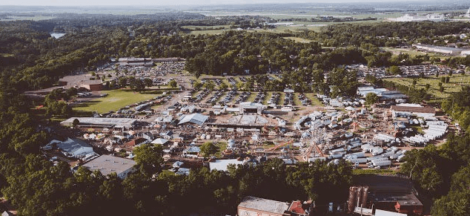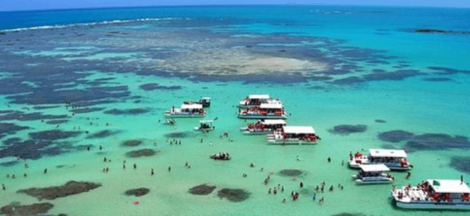Introduction
Casa Do Albergado De Manaus (04.312.401/0004-80 Casa Do Albergado De Manaus), identified by the unique CNPJ number 04.312.401/0004-80, is a correctional facility located in Manaus, Brazil. Over the years, this institution has been plagued by shocking conditions that have raised concerns about the well-being of its inmates and the efficacy of the Brazilian criminal justice system. This article delves into the various issues and challenges faced by Casa Do Albergado De Manaus, shedding light on the need for urgent reforms to improve the living conditions and treatment of prisoners.
Read Also Javaughn J. Porter Mother
The History of Casa Do Albergado De Manaus
The Casa Do Albergado De Manaus was established with the aim of providing rehabilitation and reintegration services for convicted individuals. Founded several decades ago, the facility was envisioned to be a place of transformation and second chances for those who had run afoul of the law. Unfortunately, as time passed, the institution struggled to maintain its original purpose, leading to a gradual decline in its effectiveness.
Overcrowding and Inhumane Living Conditions
One of the most pressing issues at Casa Do Albergado De Manaus is severe overcrowding. The facility, originally designed to hou limited number of inmates, now accommodates far more than its intended capacity. As a result, prisoners are often crammed into small and unhygienic spaces, leading to a host of problems related to health, sanitation, and safety.
In addition to overcrowding, the living conditions inside the facility are deplorable. Inmates report inadequate access to clean water, improper sanitation facilities, and substandard food quality. These conditions not only violate basic human rights but also hinder the rehabilitation process, making it challenging for prisoners to reintegrate into society upon release.
Lack of Medical Care and Mental Health Support
Another shocking aspect of Casa Do Albergado De Manaus is the lack of adequate medical care and mental health support for inmates. Many prisoners suffer from various health issues, both physical and psychological, which are often left unattended due to insufficient resources and trained personnel.
Without proper medical attention, illnesses and injuries can worsen, and mental health conditions can spiral out of control. This neglect exacerbates the challenges faced by individuals attempting to rebuild their lives after serving their sentences, making them vulnerable to relapse into criminal behavior.
Violence and Abuse
Disturbing reports of violence and abuse within the walls of Casa Do Albergado De Manaus have surfaced over the years. Inmates have spoken out about physical assaults from other prisoners and even from the prison staff. Such violence perpetuates a cycle of aggression and retaliation, further compromising the safety and well-being of everyone involved.
Read Also Angela’s Bangalore Luxurious Travel Experience in India Garden City
The Need for Reforms
The shocking conditions inside Casa Do Albergado De Manaus highlight the urgent need for comprehensive reforms within the Brazilian criminal justice system. It is crucial to address the issues of overcrowding, inadequate living conditions, and the lack of proper medical care and mental health support.
Rehabilitation should be at the core of the correctional process, with a focus on providing inmates with education, vocational training, and opportunities to learn valuable skills that will aid their reintegration into society.
The Importance of Public Awareness and Advocacy
Addressing the shocking conditions at Casa Do Albergado De Manaus requires collective efforts from various stakeholders, including the public. Public awareness plays a crucial role in highlighting the issues faced by inmates and drawing attention to the urgent need for reform.
Through social media, news outlets, and community discussions, concerned citizens can share information about the conditions inside the facility, bringing these pressing matters to the forefront of public consciousness. This increased awareness can generate empathy and support for the inmates, encouraging others to join the advocacy for change.
Advocacy groups and non-governmental organizations (NGOs) also play a vital role in driving reform efforts. These organizations work tirelessly to promote prisoner rights, provide legal support, and conduct research to expose human rights violations within correctional facilities. They collaborate with government authorities and other relevant institutions to implement impactful reforms and create a safer environment for inmates.
Rehabilitation and Skill Development
A fundamental aspect of reforming Casa Do Albergado De Manaus lies in shifting the focus from punitive measures to rehabilitation and skill development. Providing inmates with access to education, vocational training, and psychological support can empower them with valuable skills and a renewed sense of purpose.
By offering educational programs, inmates can improve their literacy, numeracy, and general knowledge, enhancing their chances of securing employment upon release. Vocational training, on the other hand, equips them with practical skills, enabling a smooth transition into the workforce.
Furthermore, addressing mental health issues is essential to breaking the cycle of reoffending. Providing access to counseling, therapy, and support groups can help inmates cope with the psychological challenges of incarceration and prepare them for successful reintegration into society.
Collaboration with Private Sector and NGOs
To enhance the impact of reforms, partnerships between the government, private sector, and NGOs are essential. The private sector can contribute to the rehabilitation process by offering employment opportunities for former inmates, creating a sense of hope and belonging in society.
NGOs can complement government efforts by providing additional resources, expertise, and advocacy. Their ability to address specific needs of the inmates can be invaluable in creating tailored solutions for individual cases.
Government Accountability and Transparency
Ensuring government accountability and transparency is crucial in driving meaningful change. Elected officials and policymakers must be held accountable for their decisions concerning correctional facilities. Regular inspections, unbiased investigations, and public reports on the conditions inside prisons can expose any abuses and neglect, leading to necessary actions and improvements.
Transparency also involves engaging with the public and other stakeholders to share progress and challenges in the reform process. This openness builds trust and encourages collaborative efforts in creating a more humane and effective correctional system.
Read Also Tichys Einblick: Exploring a Leading German Magazine
The Path Forward: A Call for Change
As the shocking conditions inside Casa Do Albergado De Manaus (04.312.401/0004-80) come to light, there is a pressing need for immediate and sustained action. It is time for Brazil to embark on a transformative journey towards a more humane, rehabilitative, and just correctional system.
Empowering Inmates through Education
Education is a powerful tool that can break the cycle of crime and poverty. Implementing educational programs within correctional facilities can equip inmates with the knowledge and skills needed to rebuild their lives. By offering access to basic education, vocational training, and higher learning, Casa Do Albergado De Manaus can become a place of hope and growth, rather than despair.
Prioritizing Mental Health and Well-being
Recognizing and addressing mental health issues among inmates is crucial. The prison environment can be psychologically taxing, and providing mental health support can significantly improve their chances of successful reintegration into society. Collaborating with mental health professionals and NGOs can ensure comprehensive and specialized care for those in need.
Restorative Justice and Rehabilitation
Brazil can embrace the principles of restorative justice, which focus on healing both the victims and the offenders. Encouraging dialogue between inmates and their victims can foster empathy and accountability. By emphasizing rehabilitation over retribution, the correctional system can help offenders develop a sense of responsibility and become productive members of society.
Reducing Overcrowding and Ensuring Safety
To tackle the issue of overcrowding, Brazil must explore alternative sentencing options, such as community service and probation, for non-violent offenders. Moreover, investing in infrastructure and technology can improve security and surveillance, creating safer environments for both inmates and staff.
Community Reintegration and Support
Preparing inmates for life beyond bars is essential for reducing recidivism. Facilitating their reintegration into the community requires collaboration with employers, social services, and community organizations. By offering support and opportunities, society can welcome back individuals who have served their sentences and seek to make amends.
Holding Authorities Accountable
Government officials and prison administrators must be held accountable for the conditions within correctional facilities. Regular inspections, independent audits, and transparency in reporting are essential to identify and address issues promptly. By fostering a culture of accountability, Brazil can ensure that the welfare of inmates remains a top priority.
Public Engagement and Advocacy
Public engagement and advocacy are vital for effecting systemic change. The power of collective voices can pressurize policymakers to prioritize prison reform and allocate resources accordingly. Engaging with local communities and raising awareness about the challenges faced by inmates can build a more empathetic and supportive society.
A Call to Action
The shocking condition inside Casa Do Albergado De Manaus is a wake-up call for Brazil. It is time for the nation to take bold steps towards a more compassionate and effective correctional system. By focusing on rehabilitation, mental health support, education, and community reintegration, Brazil can unlock the potential for positive change within its prisons.
The road to reform may be challenging, but it is a journey worth embarking on. Together, we can build a correctional system that not only punishes but also rehabilitates and transforms lives. Let us stand united in our commitment to ensuring justice, dignity, and hope for all, including those within the walls of Casa Do Albergado De Manaus and correctional facilities across Brazil.
FAQs (Frequently Asked Questions)
- How does the Brazilian government plan to address the shocking conditions at Casa Do Albergado De Manaus? The Brazilian government has acknowledged the issues at Casa Do Albergado De Manaus and has committed to implementing necessary reforms. They are working with experts, NGOs, and other stakeholders to devise a comprehensive plan for improvement.
- What role can international organizations play in supporting reform efforts in Brazilian correctional facilities? International organizations can provide technical expertise, funding, and advocacy support to bolster reform efforts in Brazilian correctional facilities. Their involvement can help maintain accountability and ensure adherence to international human rights standards.
- Are there success stories of prison reform from other countries that Brazil can learn from? Yes, several countries have implemented successful prison reforms that have resulted in improved living conditions, reduced recidivism rates, and better integration of inmates into society. Brazil can study these success stories to adopt effective strategies.
- What are some potential long-term benefits of investing in rehabilitation programs for inmates? Investing in rehabilitation programs can lead to reduced crime rates, lower incarceration costs, and a safer society. By equipping inmates with skills and support, they are more likely to become productive members of society upon release.
- How can the general public support the reform efforts for Casa Do Albergado De Manaus and other correctional facilities? The public can support reform efforts by staying informed, engaging in discussions, and supporting organizations advocating for prisoner rights. Additionally, they can urge their representatives to prioritize prison reform and hold them accountable for progress.
Read Also Fitful Focus: Get Fit, Stay Full, Be Focused
Conclusion
Casa Do Albergado De Manaus (04.312.401/0004-80) stands as a stark reminder of the challenges faced by correctional facilities in Brazil. The shocking conditions and systemic issues plaguing the institution call for immediate action and meaningful reforms. By prioritizing the well-being and rehabilitation of inmates, Brazil can take significant strides towards creating a fairer and more effective criminal justice system.





 Bail Money Loans in Rowland Heights, CA
Bail Money Loans in Rowland Heights, CA